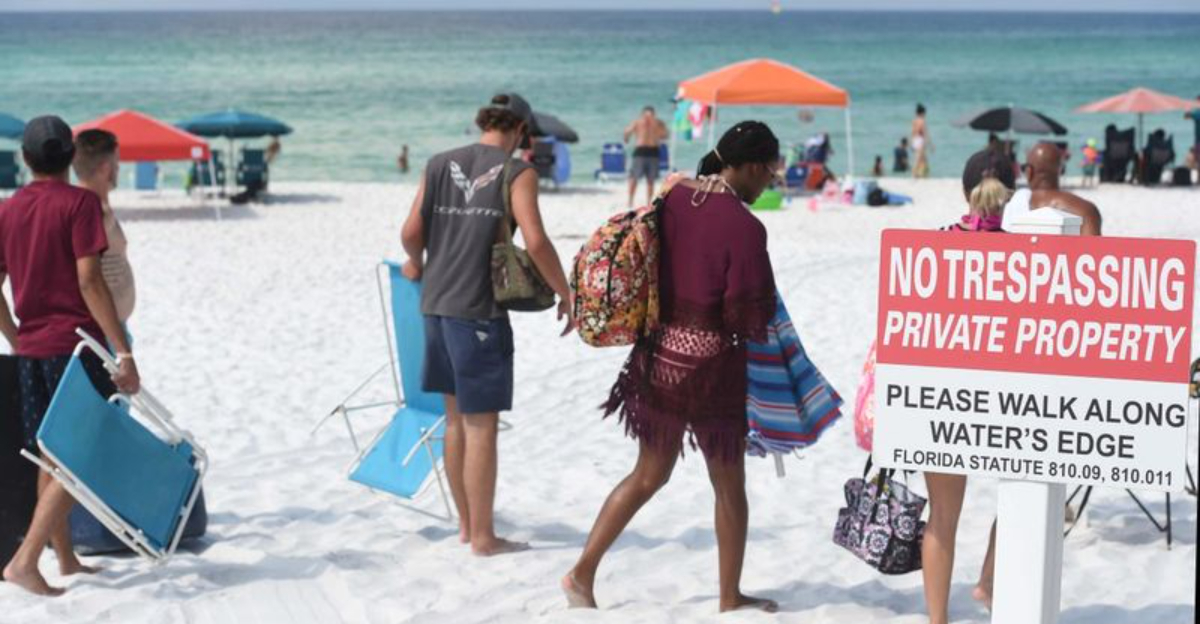
Florida beaches draw millions of visitors every year with their white sands and blue waters. But a confusing law has created headaches for tourists simply trying to enjoy the sunshine. The battle between public beach access and private property rights has left many vacationers unsure where they can legally spread their beach towels. Understanding this unusual law can help you avoid uncomfortable confrontations during your Florida vacation.
Understanding the “Mean High Water Line”
The key to navigating Florida’s beach law is understanding the “mean high water line” – an invisible boundary dividing public and private beach areas. The wet sand area touched by ocean tides belongs to the public, while the dry sand area might be privately owned.
This distinction creates practical absurdities. A tourist might legally stand ankle-deep in water but receive trespassing warnings for placing their beach chair on dry sand behind them.
The line itself isn’t marked and shifts with erosion, storms, and tides. Even experts struggle to determine its exact location, leaving beachgoers with an impossible task of figuring out where they can legally relax.
The History of Beach Access in Florida
Florida’s beaches weren’t always a battleground between public enjoyment and private ownership. For centuries, the sandy shores were considered open to everyone under the doctrine of “customary use” – the idea that if the public has historically used an area, that right continues regardless of property lines.
Coastal communities developed their own local ordinances to balance property rights with beach traditions. Most operated under the assumption that beaches were for everyone’s enjoyment, with reasonable
limitations.
This balance worked relatively well until development boomed along Florida’s coastline. Wealthy property owners began asserting stronger claims to beaches behind their homes, setting the stage for conflict.
Florida’s 2018 Customary Use Law (HB 631)
The game-changer came in 2018 when Governor Rick Scott signed House Bill 631. This controversial legislation dramatically altered how beach access disputes were handled by prohibiting local governments from establishing customary use ordinances without court approval first.
Suddenly, counties couldn’t simply declare beaches public based on historical use. The burden shifted to local governments to prove in court, parcel by parcel, that the public had established customary use rights.
The law effectively strengthened private property claims while weakening public access protections. Beach towns that had maintained open beaches for generations found themselves unable to enforce public access without lengthy legal battles.
How the 2018 Law Affected Tourists
Many visitors have experienced the shock of being confronted while sunbathing on seemingly public beaches. Vacationer Janet Miller described being approached by security guards while sitting on dry sand in Walton County: “We’d been coming to this same spot for 20 years when suddenly we were told we were trespassing.”
Some beachfront owners installed ropes, signs, and even hired private security to remove tourists from “their” sand. Police were frequently called to mediate disputes.
Travel forums filled with confused visitors asking where they could legally enjoy Florida’s beaches without harassment. Tourism officials worried about the impact on Florida’s beach-dependent economy.
The 2025 Repeal (Senate Bill 1622)
Relief finally arrived with Senate Bill 1622, signed in 2023 but taking full effect in 2025. The legislation effectively repeals the controversial aspects of HB 631, restoring local governments’ authority to establish and protect customary use of beaches without lengthy court battles.
Communities can once again pass ordinances declaring beaches open to the public based on historical use patterns. The bill represents a significant victory for beach access advocates who argued that Florida’s shores belong to everyone.
Property rights supporters criticized the change, claiming it undermines constitutional protections. However, lawmakers emphasized that the bill balances private ownership with the public’s traditional right to enjoy Florida’s most famous natural resource.
What This Means for Beachgoers Today
During this transition period between laws, beach access remains complicated. Tourists should research specific beach destinations before visiting. Some counties like Volusia and St. Johns have strong customary use ordinances already in place, making most beaches fully accessible.
When in doubt, stick to state parks and public beaches with designated access points and facilities. These areas guarantee legal beach enjoyment without property disputes.
Beware that some private owners may still attempt to restrict access despite changing laws. If confronted, remain polite but consider contacting local authorities rather than engaging in direct conflict with property owners or security personnel.
Lessons from Florida’s Beach Law Shuffle
Florida’s beach access saga highlights the tension between public enjoyment and private property rights that exists nationwide. The battle reminds us how quickly traditional public spaces can be restricted when laws change.
Travelers should always research local regulations before visiting natural attractions, not just in Florida. Environmental attorney Sarah Johnson notes: “What happened with Florida beaches could easily happen with lakeshores, forest trails, or mountain access points in other states.”
The controversy also demonstrates how citizen activism can influence policy. Public pressure and tourism concerns ultimately helped reverse restrictive legislation, proving that protecting shared natural resources requires public vigilance.
Dear Reader: This page may contain affiliate links which may earn a commission if you click through and make a purchase. Our independent journalism is not influenced by any advertiser or commercial initiative unless it is clearly marked as sponsored content. As travel products change, please be sure to reconfirm all details and stay up to date with current events to ensure a safe and successful trip.